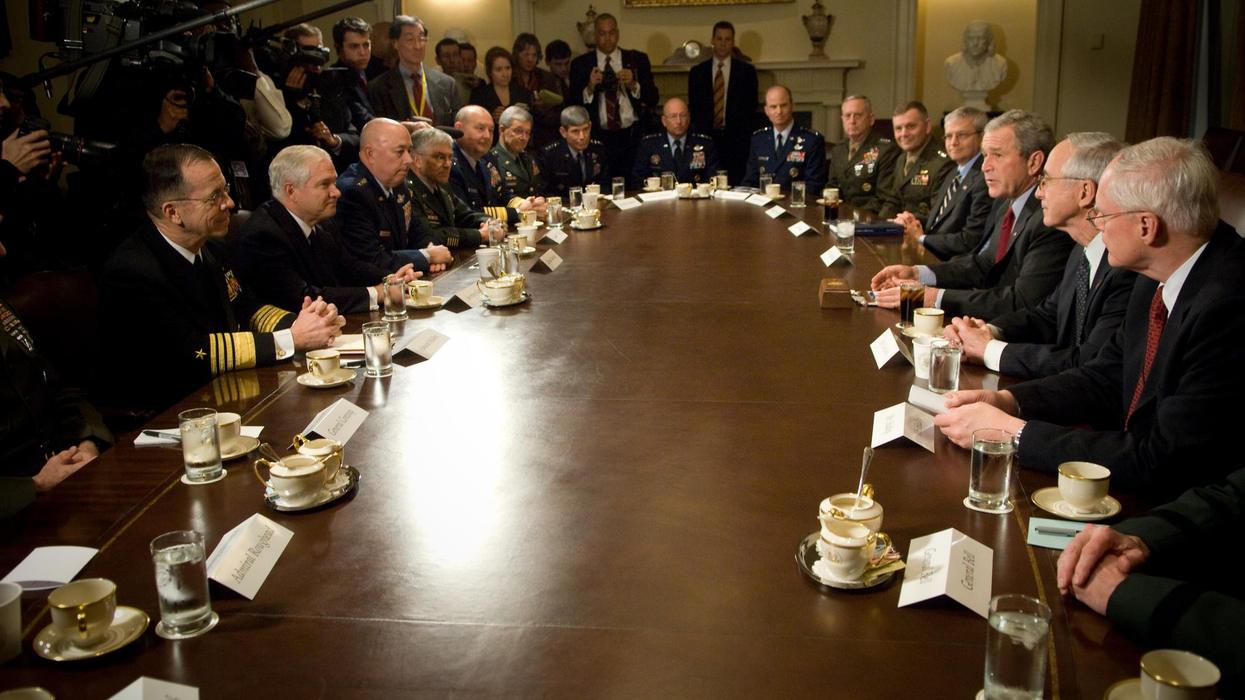The non-partisan Congressional Research Service maintains a list of every “notable” use of U.S. military force abroad. As of June of last year, the list ran on for 46 pages. Last night, President Joe Biden added his first entry when he ordered airstrikes on militia forces on the Iraq-Syria border. What happens next will help determine just how many more pages get added during the rest of the Biden administration.
While details are still emerging, the basic outlines of the airstrikes appear to be that the president ordered them in retaliation for recent missile strikes on U.S. forces in Iraq, particularly the February 15 strike that killed a Filipino defense contractor and injured a U.S. servicemember in Erbil, Iraq. It’s worth noting that this was seemingly not an isolated incident, with multiple attacks having occurred off and on for some time now on various bases housing U.S. personnel throughout Iraq.
As is often the case with recent instances of U.S. military force abroad, a debate has quickly emerged on what legal authority such an attack was conducted under and if it complied with international law. The administration claims it acted in self-defense. Multiple members of Congress have weighed in, with some of Congress’s strongest war powers champions either outright rejecting or raising significant concerns about the administration’s claims.
These are all important questions, and they deserve urgent and fulsome answers. Yet even as we get to the bottom of these issues, we should not lose sight of what the entire episode says about where we find ourselves today and the strategic choices sitting on Joe Biden’s desk awaiting answers.
Browsing through those 46 pages of military force, you’ll notice something striking. The first century and a half of our nation’s history, from its founding through the end of World War II, take up less than one quarter of the entries. Moving from there to the end of the Cold War only takes another pair of pages. The journey from the start of 1991’s Operation Desert Storm to the present, though, will take you through more than 30 long pages of airstrikes, invasions, and other instances of trying to bomb our way to peace.
Making sense of that history requires us to not just debate legal questions — important and serious though they are — but to begin to reckon with the big picture, structural questions at the very core of our broken status quo of endless war.
Once again, our nation used its ultimate power without the very public and purposeful debates our founders enshrined as our most important check against war. When the framers were choosing where to put the power to declare war in the hands of their new government, they had a choice between the executive and Congress.
Living in a time of monarchs who sent their nations to war for petty grievances and personal aggrandizement, they wisely chose the latter. They wanted the government to have to debate and vote in public about whether or not we should commit ourselves to war. They wanted the public to have a chance to weigh in and say no. They wanted it to be hard to go to war. And for two centuries, that mostly worked. Yesterday’s strikes in Syria remind us, though, just how badly the current system is broken — how far we’ve come from the way it’s supposed to work.
Whatever authority was used to launch the strikes, it has been nearly 20 years since Congress debated and weighed in on our wars in the Middle East. The U.S. forces who came under attack in Erbil are serving in a mission that itself has never been explicitly authorized, which only highlights the absurd paradox of debating the legality of self defense authority in an otherwise illegal, unauthorized mission.
The fact of the matter is whatever is happening today in Iraq and Syria is a state of conflict, an endless war, existing in a perpetual cycle of attack and counterattack, retaliation and retribution, that can only be broken by choosing to walk away. There is no winning an endless war, there is only loss and suffering, not least of all for the people in Iraqi, Syria, and Iran on whose homes we are waging it.
Thankfully, there is another path forward. Six years ago, the United States, along with Germany, France, the United Kingdom, China, Russia, and Iran collectively successfully negotiated the Joint Comprehensive Plan of Action, the JCPOA or Iran nuclear deal. After decades of trying to resolve security challenges on the battlefield with little success, the JCPOA represented a historic bet on diplomacy. At its core, the JCPOA is a demonstration that a country’s diplomats could achieve what their warriors had failed to: a resolution of their differences and a mutually beneficial path forward.
It was not a comprehensive peace, few ever are. Rather, it was a step-by-step process, starting by constraining Iran’s nuclear program and eliminating the risk of nuclear proliferation, that could and should have been built upon with further progress on our countries’ numerous other challenges. Unfortunately, Donald Trump chose to walk away — despite his own administration’s recognition that the deal was working — and embark on a path of “maximum pressure.” That path brought the United States and Iran to the brink of all-out, direct war multiple times during his presidency and remains one of the key drivers of the instability and conflict so violently on display this week in Iraq and Syria.
Today, as President Biden assesses his next steps, he would do well to remember how we got here, and use this opportunity to quickly and sharply change course. He should, of course, begin by ending “maximum pressure” and rejoining the JCPOA, putting the United States and Iran firmly back on the path of diplomacy. That alone, of course will not be enough to undo the damage already done not just in the last four years but the last 30. To achieve that will require the president fulfilling another campaign promise: to truly end our endless wars in the Middle East.
That will be no small undertaking, and it will require questioning and rejecting the status quo thinking that led him to his first airstrikes. But the alternative is unthinkable. Failing to do so will not only mean Joe Biden adds even more pages of military misadventures to the 46 that came before him, he will have missed a historic chance to choose peace, diplomacy, and justice, over war.

















